- Home
- Hanif Kureishi
A Theft: My Con Man Page 2
A Theft: My Con Man Read online
Page 2
He began to call me regularly from Spain, sometimes twice a day. When I told him what anguish and shock this theft, this violation and stupidity, had visited upon me and my family, and when I wondered what the point of his promises was, he’d apologise for what he’d done, saying his only chance was to pay everyone back. There was no point in any of us contacting the police, he said; the money would never be returned if he was in prison. I had to give him one more chance; he knew how to sort it out. Crime hadn’t been his career choice, otherwise he’d have disappeared to Albania, where his fiancée’s family lived, and where he could, at least, have worked as an accountant. No; he’d made the wrong move because the scheme had looked good to him, and he’d invested for us. And for himself, of course. Still, all would be fine; my money would be returned ‘by Thursday’. It became a family joke. He was the ‘Thursday man’. Many Thursdays came and went, yet his little squeaky voice was always optimistic. The money would ‘definitely’ turn up. ‘They have no choice,’ he’d say. ‘It’s our money.’ It was yes, yes, yes, with him. And so in this way days, weeks, months passed.
Not speaking to the police was the only leverage I had over him. But then he exhorted me to pity him. He had placed himself, I could see, at the centre of a large network of people who were dependent on him. Having obtained money from twenty of his friends, as well as members of his own family, all these distressed people were now calling him; they all required information, and he connected us all, sitting in the centre of the shattered mirror of his life, like a broken, helpless king muttering meaningless phrases.
There was another thing. One morning, just before he left for Spain, Jeff had rung to say he hadn’t been in contact because his mother’s sister had died and he’d been at another funeral. Soon he informed me that two of his investors and three members of his family had recently died. His fiancée’s mother was on the verge of death. They were dropping like flies; he seemed to be aware that he was killing everyone around him. We had entered a wild disorder – the realm of death, if not murder – in his mind. But not only had he stolen from me, and, in total, about four million pounds from others, he wanted consolation and support. He had it, too; I threw myself into an orgy of encouragement. What an unlucky fellow he was with everyone dying around him, and what a bad year he was having in this cemetery of ghosts. Was there anything I could do? If he ever needed to talk, I was there. When it occurred to me to go to his house and stand outside, watching his movements and seeing how he lived, I visualised relays of semi-concealed desperate voyeurs observing one another while attempting to remain unnoticed.
Once, later, when I couldn’t find him, when his phone was cut off in Spain because he couldn’t pay the bill, I fell into a sort of raging madness, and didn’t know what to do with myself. I walked, I punched things and shouted obscenities; at one point, I was phoning him every fifteen minutes. I just had to know where he was. But perhaps he was busy soothing the many others he had reduced to the same condition?
There was nothing sensuous or erotic in all this fury and despair. In fact, it could lead you to believe that life is hopeless, and nothing but a trap. Yet however ridiculous, shaming and humiliating it was, the game could not end. That was the one thing which could not happen. Jeff was the lover I always wanted to hear from and was even keener to see. I would beg him for a ‘new lie’, and he would give me one, and they were some of the best lies I’d ever heard. He was never haughty, cruel or taunting, but always straightforward, as if he understood that deception was a medicine I required urgently. Forever waiting for my man, I was reminded of a coke dealer I had in the nineties, a sweaty, paranoid madman whose eventual arrival in a knackered Rolls-Royce, with a pit bull – a snuffling violent ball of threat which he would release in my flat – was greeted by me as a great event, as the highlight of the day. I’d given Jeff my savings, why not give him my time and health and life too? Usually, when one believes one is most safe, one is in most danger. But I knew how easy it is to become addicted to catastrophes, and how difficult it is to let go of violent pleasures. What was happening to me?
There’s a passage in Nietzsche’s The Gay Science which states, ‘What if a demon crept after you one day and said to you, “This life, as you live it now and have lived it, you will have to live again and again; and there will be nothing new in it, but every pain and every joy and every thought and sigh will have to return to you, all in the same succession and sequence. The eternal hourglass of existence is turned upside down again and again, and you with it, speck of dust.”’ And in Thus Spake Zarathustra Nietzsche writes, ‘Time is a circle. Do you desire this innumerable times more?’
I began to wonder if I was being thrust back into something I recognised. I come from a South London suburb, and though Jeff was in his early forties and I’m fifteen years older than him, growing up in 1960s South London I knew plenty of post-war spivs and wide boys like him. The area was full of smart and nasty thieving crooks and off-the-back-of-a-lorry merchants. The other significant interest of the suburban young was music. A lot of bands made the relatively short journey to the suburbs, and many kids were starting to form groups. The music and the drug dealing and thieving had one thing in common, which was a kind of defiance of dead authority and the manufacture of excitement through transgression. But the music we heard and made, and the clothes and creativity which came out of it, was alive, and represented a future, while the thievery was a futility. But I couldn’t, then, always tell them apart, and the mad thing was, I still hadn’t learned.
*
Chandler told me the police arrested him on the plane when he came back from Spain. This annoyed and embarrassed him in front of the other passengers. ‘I wasn’t going to run away. They didn’t need to do that,’ he told me sniffily. Apparently he didn’t say much when the police interviewed him, and he was soon on bail. Over Christmas we met a couple of times and he continued to say the money was about to turn up. He was not pleased with the police. They were not giving him the chance to retrieve the money, and they had upset his frail mother by mentioning jail. Couldn’t they be more sensitive? I asked him how his Sundays were, how going to church with his family, in such circumstances, made him feel. He said it had been difficult for them all – there had been ‘looks’ – since it was now known that he had stolen the church fund he had been charged with taking care of. But he was keen to let me know that ‘God is a forgiving fellow’.
‘That’s all right, then,’ I said.
‘Many of the others will never be repaid, but for you there is still a way out,’ he said, leaning forward.
Unsurprisingly for someone so isolated and living in their own mind, there were labyrinths of mysterious complication without conclusion which he confused and bored me with. But it seemed to boil down to this: though he wanted to pay me back, since he’d been pinched by the police and couldn’t move money around in his own name, I had to open an account in Nevada or the Channel Islands. That way the money wouldn’t show up in my bank statements. Or I could, he said, go to Switzerland, pick up the money in cash, and carry it in a suitcase to another bank. I pictured myself walking around Geneva with thousands of euros in a bag, and while the idea made me laugh, I wondered how things had come to such a pass, and what my children would think. I told him I was ready to book my flight. I was keen to see Geneva, even in winter.
In the cafe that day, examining this peculiar little Lucifer in his cheap shoes, as his phones buzzed at his fingertips, a man who had just smugly announced he’d forgiven himself, I considered the enigma of madness. How could he appear so unworried? How could he deem a catastrophe and the creation of so much fury a local difficulty? I wanted to know him, but he did not want to know himself. Nothing about his own state of mind concerned him. Perhaps his actions were his only thoughts, and there was nothing in his mind at all. Not that distress did not exist. He had inserted it into us, his victims, rendering us afraid, depressed, furious, sleepless, guilty, while he was blithe and even jaunty. Not that s
uch separation doesn’t happen all the time. In this Hollywood world of heroes and villains, good and evil are kept apart; there is no confusion, ambiguity or subtlety. And when, at the end of the Hollywood piece, the two antitheses confront one another and fight to the death, good always succeeds. But when evil is a form of goodness, when, say, it is innocent or even altruistic, there occurs something which cannot be grasped, let’s call it an impossibility. And it was this I was trying to know, and, eventually, write from or out of.
Jeff told me he was ringing his victims regularly, to calm them down and keep them informed, though one of his school friends, whom he persuaded to invest his savings, was about to lose his house. But still I wouldn’t hear it when people I’d confided in dismissed Jeff as a toxic little thief. Jeff was a hero for wanting to make reparation; he was doing his best: he was aware he had almost run out of chances. If idiots are elevated into gods all the time, he was at least my idiot. Not only were we friends, I would continue to believe that he would deliver me into the light, and then I would be happy and free. Yet how is it that people can get stuck inside you, like dreams which refuse to yield up the secrets of their horror, and you can’t wake up or grasp what’s going on? I began to mirror his behaviour. Manically obsessed with him, I couldn’t sleep. I wished him to die, but ended up wishing I could die.
*
As I walked about, thinking him through, it came back to me, after a while, where I had seen something like this before. Had Jeff always been there? In what sense had he – or a man resembling him – always been present in my life? And when I wasn’t using him to undermine and depress me, what use could he be? Would I have to look at his face forever? For there were, when I could bear to think about it, an eternity of Jeffs, of mostly older men whose stories I’d attend to. There are friends you begin to hate even as you love them, even as they waste you, and you refuse to see how tiresome and what an expense it all is. What emerges in such friendships is the same thing repeatedly, until both partners become sadistic. The ending of significant friendships is painful, yet still I believe in the future; rebirths are possible: there are conversations where new things can be said and heard.
*
My father, born in Madras, had been at the younger end of a large family of mainly boys who were rough and competitive. In his early twenties my father came from Bombay to London to study and to make a new life. He married an Englishwoman, left college and settled in the suburbs, where the quiet and regularity suited him, and he liked the people. But Dad’s job, in the Pakistani Embassy, was dull and badly paid, and without a pension. My mother and I urged him to find a better job and, at one point, he considered joining the police as a clerk. He also considered becoming a traffic warden. But in the end Dad refused to change. He thought he was better than all that: another job was unimportant, it was nothing, because soon, he imagined, he’d become a writer. He would have the dignity and class an artist deserved. But until then we had to provide encouragement and support, keeping the faith. We were supposed to be fans and believers, maintaining the master in his place. Our love and confidence would keep him afloat, just as the prayers of the faithful keep God from discouragement. Whatever happened, we could never be disappointed in Dad; the good thing would turn up. After all, self-belief is necessary, isn’t it? And, surely, one should have grit and never give up.
However, I figured out, years later, that I in particular had been persuaded. I had betrayed a more thoughtful and realistic position, getting everything the wrong way round. Somehow I had joined a protection racket or cult. Whatever happened, Dad couldn’t be disenchanted, or taste the bitterness of failure. It had become my job, as his disciple and imitator, to shield him from truths which, however tough they might have been, could have made him more imaginative. That was my naivety; but I was young, and this was ages ago, before I could recognise how necessary and important disappointment is, and long before I saw that others’ delusions keep them sane, but don’t necessarily do the same for us.
*
In many other ways, my mates and cohorts and those a bit older in the sixties and seventies, mature property owners now, were a generation of hoodwinked fools. We, who had denounced and given up on numerous authorities, had sought new masters over and over again. Friends, and those in our circles, were Maoists, Stalinists and Trotskyites of various types; others I knew followed Scientology and similar groups, like EST (Erhard Seminars Training), to which they showed cult-like dedication. We doubters seem to be easily impressed by those with conviction. And it is the attitude of the believer rather than the belief itself which is the crucial thing here. Whether it’s political or scientific salvation, seventy-two virgins waiting in heaven, a particular example of satanic ritual abuse, or the idea that one has a crucial message of liberation for the world, it is the state of absolute certainty and dogmatism which is the menace. The idea that by removing the object of the delusion one will cure the delusion is itself a delusion. Delusions are two-a-penny; what is significant is the attitude taken towards the material. Any fool can believe the sun will rise tomorrow: it takes a certain kind of absurd commitment to believe in, say, the efficacy of lifelong celibacy, or prayer or heaven, or some kind of political paradise – or to believe in a con man. It is the absurdity of the belief which makes the commitment to it absolutely necessary, and the intractability of the conviction will be in inverse proportion to the unsustainability of the idea.
In my case absurdity had certainly created commitment. I and some others kept Jeff going, as if he had started his own religion. But it was from this engagement with Jeff that a question formed in my mind, one of the most important there is. Can one person drive another person mad, persuading them to forsake that which is truly of value, collapsing their mind so they see reality askew? Certainly, adults can drive children mad, and adults can make one another crazy by creating conflicts in them which seem insoluble, or for which the only solution might appear to be a retreat into inner chaos and disintegration. Jeff seemed to have that effect on me. But if my head was parked under the bed, I had to wonder about my own part in putting it there. I seemed to have willingly joined a sect and come to believe that my suffering was worthwhile and would lead, eventually, to relief and happiness. I had believed Jeff was the solution when he was the problem, and that my madness was the only thing keeping me sane.
Sometimes you can only get anywhere by giving up on people, by cutting the links between you. How do you begin to do that? With Jeff, it felt as if he was no longer a real person in the world, but, rather, as if I’d swallowed but could not digest him. People can kill themselves to get rid of a devilish persecutor inside them.
*
The last time we met, in a cafe near my house, Jeff wasn’t in good shape. His fiancée seemed to have disappeared, and she didn’t want to know anything about where he’d got so much money from, or even hear from him again. Thugs had been coming to his place to threaten him, and he’d had to call the police. It seemed to me that his mania had surrendered to disintegration; his body had given up and he couldn’t get out of bed or wake up properly. He could barely breathe or talk. I told him that it had been nine months since my money had gone missing, and I was going to give a statement to the police. He looked alarmed and promised to give me a ‘little bit’ on Monday, and he winked. To prove it – and, perhaps to keep up appearances – he showed me a bank statement for forty-three million rials belonging to a Dubai sheik he’d ‘invested’ for.
I laughed and attempted to add to the bitterness of his woes by telling him that I’d worked briefly in a women’s prison and could still recall the hopeless cries of the self-harmers and the clink of keys being turned in locks. He nodded and said that it was now inevitable that he would have to do ‘time’. He knew he wouldn’t like it in jail, particularly as he was claustrophobic. His voice began to break, and he said he’d only stolen money – or ‘borrowed’ it, as he preferred to put it – when he’d received a notice claiming to deliver £350,000 to his accoun
t. He’d then begun to move money around, and everything went crazy, as it can when you get desperate and start to panic. I visualised him being encircled by those he’d wanted to enrich; and I knew he feared being shut in, and returned to the place he was most afraid of. The claustrophobic desires his own immurement, and he had brought it about that he would be shut in for a long time.
That’s justice for you, and as I watched the sexless, bland bean counter walk away, it just seemed obvious that time is more valuable than money. If it took me a while to see this. Chandler had done me a terrible disservice by creating the impression that money was the only important thing in the world, that it was love itself, the milk of paradise, the medium that mattered the most, being more important than ideas, or poetry, or friendship or conversation. This was the point at which communism and capitalism met: where the single value was the crudest form of social utility.

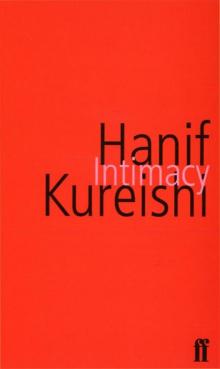 Intimacy
Intimacy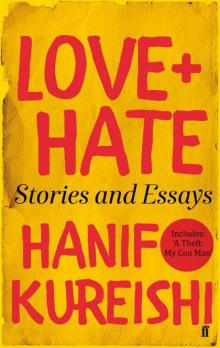 Love + Hate: Stories and Essays
Love + Hate: Stories and Essays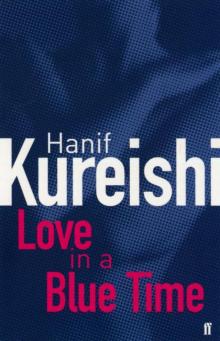 Love in a Blue Time
Love in a Blue Time Something to Tell You
Something to Tell You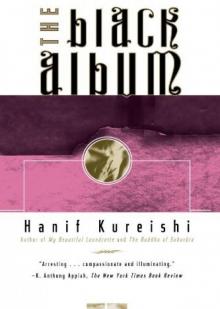 The Black Album
The Black Album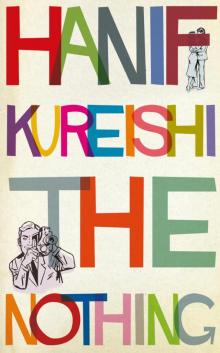 The Nothing
The Nothing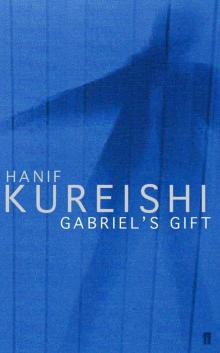 Gabriel's Gift
Gabriel's Gift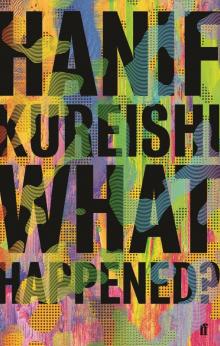 What Happened?
What Happened? Midnight All Day
Midnight All Day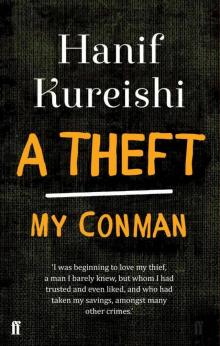 A Theft: My Con Man
A Theft: My Con Man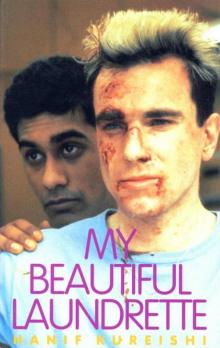 My Beautiful Launderette
My Beautiful Launderette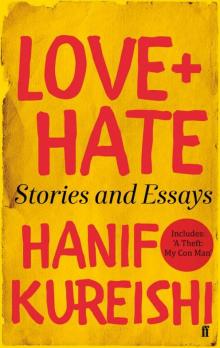 Love + Hate
Love + Hate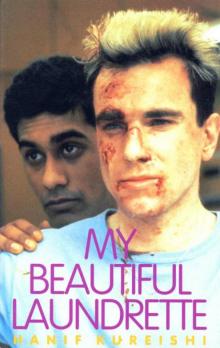 My Beautiful Laundrette
My Beautiful Laundrette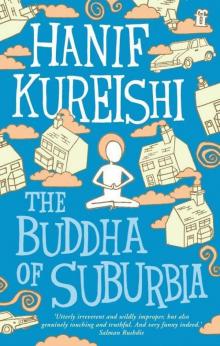 The Buddha of Suburbia
The Buddha of Suburbia